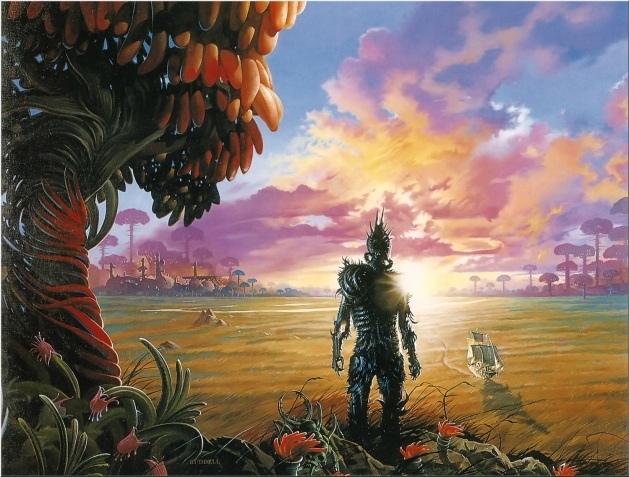I read the first two books of Dan Simmons’ Hyperion Cantos (Hyperion and Fall of Hyperion). I have been roundly advised not to continue with series, and I am not, especially after reading the end of Fall. Overall these two books deserve their relatively high reputation.

Hyperion was the stronger book, I suspect because of its episodic nature. Both are around 500 pages long, but the density of the narrative in Fall is much higher since most of the space in Hyperion is taken up by the pilgrims’ loosely connected stories. Fall was good on its own (though you’re about to hear me complain about it some more), but just didn’t maintain the same high standard of quality. Any reader who likes Hyperion will find it very difficult not to pick up Fall to resolve the cliffhanger, anyway.
Full disclosure, I’m not much of a fan of Keats (yeets > keets) while Simmons obviously is. However, I have no complaints that one of the characters is literally a simulacrum of the Romantic poet. The Keats analogue takes to the 27th century a bit too easily, but the book has enough pages without digressing into fish-out-of-water tales. Simmons doesn’t ever put original poetry into the mouths of his characters, even though one of the non-Keats characters is a brilliant poet in his own right. Producing even scraps of the actual epic Hyperion Cantos by Martin Silenus is rather much to expect. Simmons knows what he’s doing, but he isn’t Milton.
Both the episodes and the framing story in Hyperion are excellent, although some of the episodes are stronger than others. The Canterbury Tales-style structure works well, and while not a total novelty is rarely seen and rarely done better than here. The detective’s story was by far the least brilliant, and it unfortunately has the most to do with The Plot of the Cantos.
Simmons’ sentimentality more than bothered me by about the midpoint of Fall. He used it to great effect in Hyperion, but he just kept pouring it on in the second book. The moral is that Love Wins, which is fine, but the number of clunky sentiments generated increased as the end drew near. Others might not be so bothered.
As often happens with sequels, Fall‘s demystification was often disappointing. What is the Shrike? A bad thing sent by the bad side to do bad things. Gee, thanks. In fairness, I will admit that the Core trying to herd humans in the the Labyrinth was delightfully creepy, and I rolled my eyes at a certain other event as being too narratively conveniently only to find that it was, in fact, a ruse.
The books bear more than a passing similarity to Ada Palmer’s Terra Ignota series. Both series are science fiction obviously more inspired by literature than by science, and feature a society unthinkingly addicted to the interconnection provided by a transportation technology it doesn’t understand being prodded out of its complacency by events along its frontier. Both even have an in-story epic poem that the authors don’t dare to quote. It lives up to its reputation, but don’t feel compelled to keep reading after Hyperion‘s cliffhanger if you’re satisfied with the abrupt ending.

1 Pingback